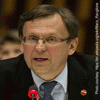So said Dr Mario Raviglione, Director of the World Health Organization (WHO)'s Global Tuberculosis Programme, in an interview given to Citizen News Service (CNS) at the ongoing 5th Asia Pacific Region Conference on Lung Health of the International Union Against Tuberculosis and Lung Disease (The Union). TB is indeed the top infectious disease killer!
Even though the TB response during the Millennium Development Goals (MDGs) era saved 37 million lives from TB between 2000 and 2013, the disease burden still remains enormous. Data shows that 9 million people fell ill with TB in 2013 and 1.5 million died of it.
Dr Raviglione lamented that with about 5 million TB cases, as well as a huge number of drug resistant TB cases, the Asia Pacific region carries two-thirds of the global TB burden. So TB has to be a high priority issue in all Asia Pacific countries and they need to act promptly through adoption and adaptation of WHO's End TB strategy 2016-2035. The vision of the End TB strategy is a world free of TB (zero TB deaths, zero TB disease, zero TB suffering) and its goal is to end the global TB epidemic (less than 10 cases per 100,000 population) by 2035.
Dr Raviglione said that the WHO End TB Strategy essentially consists of 3 pillars--integrated, patient-centred TB care and prevention; bold policies and supportive systems; and intensified research and innovation.
He explained, "The first pillar talks about basics of TB strategy, along with innovations like the drug susceptibility test (DST) to be prescribed for every person with TB on day one itself and not to be postponed for later. This means putting appropriate systems in place and expanding use of rapid molecular diagnostic tools. But many countries have yet to understand and appreciate this. We also have to proactively reach out to, and screen, high-risk populations, including those who present with diabetes or HIV (as they are more prone to TB risk). We also need to provide prophylaxis to at least people living with HIV (PLHIV) and the children contacts (below 5 years of age) of TB patients. But other high-risk groups should also be considered for prophylaxis."
"The second pillar talks of universal coverage or universal access to TB services and social protection. A person should be able to access TB diagnostics and treatment without catastrophic expenditure - either free of charge or through some health insurance system. Universal access has to be accompanied by social protection. TB treatment lasts long, making people poorer in the process as they lose their income and also increase their medical expenses. Governments must ensure that TB patients are in the list of those who are entitled for social protection. Another important thing is to have mandatory notification of all TB cases."
"The third pillar is about intensified research. This requires national research agendas so that the different research institutes can collaborate and avoid duplication, especially in case of operational research. Unless we address all of these issues we will not be able to implement the WHO End TB Strategy."
We are about to enter the 2016-2030 era of the new ambitious Sustainable Development Goals (SDGs) that are likely to be passed by the UN General Assembly in September 2015. SDGs envisage, among other things, to reduce TB deaths by 90% and TB incidence by 80% (less than 20 cases per 100,000) by the end of 2030. This is in line with the targets of End TB strategy that aims reducing TB deaths by 95% and TB incidence by 90% (less than 10 cases per 100000) at the end of 2035.
(Note: You can view every article as one long page if you sign up as an Advocate Member, or higher).






